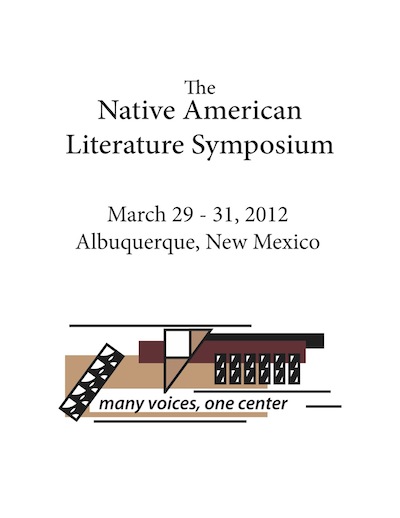Conference Spotlight: The Native American Literature Symposium (Part 1)
First, thanks to the Poetry Foundation for inviting me to contribute. I am honored and humbled to be among such great poet-bloggers.
One of my favorite annual conferences is the Native American Literature Symposium (NALS). The last time I attended this conference was in 2010, and I also blogged about it then for the Poetry Foundation, so I thought this would be a good way to begin national Poetry Month in 2012. Poetic time is indeed round.
This year, the conference was held on the Isleta Pueblo reservation in the state of New Mexico. Whenever I travel to the Southwest, I am always reminded of the experience of Spanish and U.S. colonialism that my people share with the native peoples of the "Southwest." As a Pacific Islander, I can't escape the irony of being on a pueblo named "Isleta," or "little island."
Despite the hauntings and continuing presence of colonialism, there are so many empowering aspects about attending NALS. First and foremost, it exemplifies native-determination; by that I mean it is controlled and designed by native peoples (shout out to Gwen and all the clan mothers and fathers) and it is held on native-controlled land (in so far as we can consider reservations native-controlled). I also love that so many native and non-native scholars, writers, artists, and educators from so many different tribes and from all over the world come together to discuss and honor native literatures.
NALS has developed a strong sense of kinship among the participants. There are usually only 2-3 panels per session, so each panel has a vibrant audience. There are also several plenary panels, as well as keynote performances and lectures. If you are lucky enough to be chosen for one of the lunchtime or dinnertime keynotes, you are guaranteed an audience of upward of 200 people. Did I mention we all eat lunch and dinner together? This creates a family atmosphere and, to be honest, it wouldn't be a native gathering without food! I especially look forward to the Pueblo dinner. Three words: green chile stew!
Before I get too distracted by the food, let me return to the beginning. I attended NALS this year as part of a panel titled "Our Sea of Stories: New Criticism in Pacific Literary Studies," with Kanaka Maoli (Native Hawaiian) literary scholars and poets ku'ualoha ho'omanawanui and Brandy Nalani McDougall. I am honored to work with these scholars at the University of Hawai'i, Manoa (UHM). Yes, UHM is the place to be for Pacific literary studies, and it's a wonderful feeling of collegiality to be able to travel, present with, and learn from ku'ualoha and Nalani.
In what we felt was a beautiful expression of Native hospitality, the organizers decided to grant us the very first opening plenary session, right after the Welcome and Blessing. We were very touched by this gesture, and it speaks to a long history of Native American and Pacific Islander literary collaborations. We hope we can someday return the favor here in Hawai'i.
We received very positive feedback about our panel. Ku'ualoha's presentation was titled "Nga Whiriwhiri Mātātuhi: Mana Wahine and Pacific Literature—Interwoven Narratives, Culture, and History in the Lives of Women," which focused on the major themes and texts of women Pacific writers. Nālani's presentation, "Gathering in the Dark and Putting Down Roots: Kaona References to Papa in Contemporary Kanaka Maoli Literature," looked at kaona (a Hawaiian rhetorical and aesthetic device) references to Papa in contemporary Hawaiian writers Haunani-Kay Trask and Mahealani Perez-Wendt. My paper focused on theorizing a relationship between ancestral Chamoru dialogue poetry and contemporary Chamoru poetry from my homeisland of Guahan (Guam).
As a scholar of both Native American and Pacific Islander literature and literary studies, I am always excited when my research interests come alive and intersect. There are so many similarities across native literatures, and it's exciting to be a part of the blossoming field of global indigenous literary studies.
Craig Santos Perez is a native Chamoru (Chamorro) from the Pacific Island of Guåhan/Guam. He is the …
Read Full Biography


